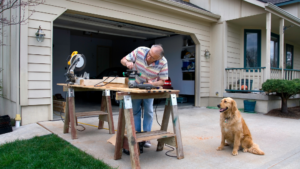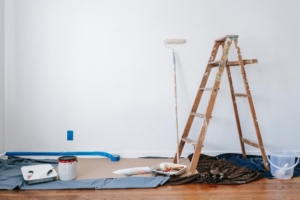
Real Estate 101: Home Inspections

Exploring the World of Home Inspection: Insights from Jay Hensleigh of Associated Master Inspectors
Today we’re interviewing Jay Hensleigh of Associated Master Inspectors, a home inspection firm based in Tigard, OR. Jay has been an inspector since 2006 in the Portland area. We asked him to share his insights about home inspections, what buyers and sellers can expect from an inspector, and what sellers should have ready if they remodeled their home.
1) Can you please describe what a typical day looks like for you?
My work day consists of either one or two inspections. For a typical home inspection, I’m onsite for about 4 hours, looking at the home and talking to the client and realtors. When you add in travel time to and from the office or between successive jobs, it can make for a very full day.
After the inspection(s), I spend an additional 2-3 hours in the office to compile my inspection findings and photos, research any unique issues discovered at the home, and review and finalize the report. Given these time investments, I find it’s logistically impossible to do more than two inspections a day. When I do have two inspections in one day, I make sure to reserve time the next morning to complete the reports.
2) What is your process for inspecting a house?
In Oregon, home inspectors are required to follow and meet tightly defined rules known as the Oregon Standards for Home Inspection, which define the extent, limits, and requirement of an inspection. Within these standards, my process of performing an inspection is primarily a visual process of discovery, essentially starting at one end of the home (roof) and finishing at the other end (the crawlspace). I carry a collection of tools to help me inspect the home, including ladders, flashlights, screwdrivers, probing tools, moisture meter, various electrical testers, and a pick-hammer.
To document issues I discover, I carry a digital camera and also have my laptop on a portable stand to enter information as I move around the property. Some areas may be fully inaccessible for various reasons or my view of various areas of components may be limited by furnishings, stored items, or appliances, and these limitations are noted in the report.
I encourage my clients to attend the inspection, but to arrive towards the end of it. This allows me time to fully focus on the home. Toward the end, I meet with my client and their realtor to review my findings so everyone is aware of the more serious issues present at the home. Sometimes we walk around the home and look at any areas the client wants to see. As we wrap on onsite, payment is usually collected from the client, and I let them know when they can expect the report.
3) If a homeowner is planning a home remodel, what should they take into consideration if they decide to sell their home in the future?
The three most important considerations are permits, permits, and permits. Did I mention permits?
In today’s world, making sure you obtain permits for renovations or repairs when required is very important. If you choose to do work without permits, it’s very likely it will come up when you go to sell the house. Most buyers will ask for permits to be obtained. Obtaining permits retroactively can be very expensive and time consuming. In worse-case scenarios, you may be required to open up walls to expose work for inspection or could even be required to demolish additions.
4) What’s one tip you can share with sellers?
How about three? First, make sure all utilities are on. Having the water, power, or gas shut-off severely limits the inspection and almost always requires a second inspection visit that often results in added inspection fees and almost always delays.
Second, making sure attics, crawlspaces, furnaces, water heaters, and electrical panels are not blocked by stored items, furniture or appliances also ensures a complete inspection without delays.
And finally, please plan to be away from the home during the inspection. Your presence can slow down the inspection process and makes it difficult for your buyer to learn about your home without some sense of unease.
5) What’s one tip you can share with buyers?
Homes are a complex compilation of materials, systems, and components. Over time, materials weather, systems age, and components wear out. As a home inspector, my primary job is to alert you to health and safety issues, structural problems, and conditions that may lead to safety and structural issues, but keep in mind that the inspection is a snapshot in time. Conditions in and around the home can and do change over time. You can be your home’s best ally by consistently performing seasonal and annual maintenance, and monitoring your home to catch and resolve any conditions that may lead to significant damage.
6) BONUS QUESTION: What drew you to home inspection?
The first time I saw a home inspector in action was 1995 when I bought my first home. At the time, I was well established in a career path as a fishery biologist, but I was intrigued as I followed the inspector around the house, and later as I read the report.
Seven years later my career transition, I started working as a handyman for a property management company, which led to construction work for a local developer, which led to getting my contractor’s license. While construction work was fun and rewarding, I wanted a more flexible and independent schedule, with more variety in my work tasks. I also wanted more interaction with clients. Home inspection seemed like it would meet these needs and would allow me to use the skills, knowledge, and experience I had built-up as a contractor and as a biologist. It took a little more training and testing, but soon I was working as a home inspector. I have found that indeed, it’s a great fit for me. The joy of the job is the mix of technical knowledge, camera and computer work, seeing all kinds of houses, and of course, meeting people as they proceed with the exciting, and stressful, process of buying a home.
Thanks Jay for taking the time to share your insights with us and our readers!
Follow Associated Master Inspectors on Facebook.
Have more questions or want professional advice on buying or selling a home?
Contact us at [email protected] or (503) 926-5213. We’re here to address all your real estate needs!




